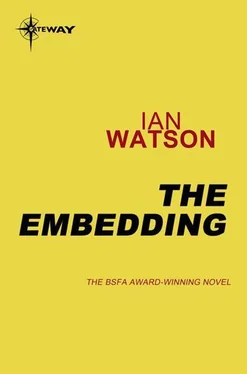Ian Watson - The Embedding
Здесь есть возможность читать онлайн «Ian Watson - The Embedding» весь текст электронной книги совершенно бесплатно (целиком полную версию без сокращений). В некоторых случаях можно слушать аудио, скачать через торрент в формате fb2 и присутствует краткое содержание. Жанр: Фантастика и фэнтези, на английском языке. Описание произведения, (предисловие) а так же отзывы посетителей доступны на портале библиотеки ЛибКат.
- Название:The Embedding
- Автор:
- Жанр:
- Год:неизвестен
- ISBN:нет данных
- Рейтинг книги:4 / 5. Голосов: 1
-
Избранное:Добавить в избранное
- Отзывы:
-
Ваша оценка:
- 80
- 1
- 2
- 3
- 4
- 5
The Embedding: краткое содержание, описание и аннотация
Предлагаем к чтению аннотацию, описание, краткое содержание или предисловие (зависит от того, что написал сам автор книги «The Embedding»). Если вы не нашли необходимую информацию о книге — напишите в комментариях, мы постараемся отыскать её.
The Embedding — читать онлайн бесплатно полную книгу (весь текст) целиком
Ниже представлен текст книги, разбитый по страницам. Система сохранения места последней прочитанной страницы, позволяет с удобством читать онлайн бесплатно книгу «The Embedding», без необходимости каждый раз заново искать на чём Вы остановились. Поставьте закладку, и сможете в любой момент перейти на страницу, на которой закончили чтение.
Интервал:
Закладка:
What would the bubbles be filled with?
Accusations? Or the key to reality? The E=MC 2of the mind?
The spring door locked behind him automatically. There was a short corridor with a second door at the end of it. He chose a second key, unlocked the door and walked through into the rear wing, where fir branches reached out to brush the windows. A corridor ran right round the outside of the wing.
The window glass bore a fine mesh of wires within it, low voltage electrified, computer monitored as part of the alarm system.
To look down from the upper windows of the manor house on to this rear wing would show you great opaque skylights that lit the rooms within the circuit of the corridor-a blank aquarium.
He unlocked his office, switched on the neon strip lights to buck up the weak winter light filtering from overhead, then as he always did first thing in the morning sat before the monitor screen and switched on.
Bad language, Eileen? Oh yes-the worst, and the best!
The screen flickered and unfogged. In a large undulating playroom two naked dark-skinned children, boy and girl, were rolling a giant beachball along. They were three or four years old. Another naked girl wandered after them, dragging a coiled plastic tube, and a second boy brought up the rear, holding his hands out before him, pretending to be blind and feeling his way.
Sole touched another switch and the sound of voices came from the playroom. However these weren’t the children’s voices.
He panned the camera-past the transparent-walled maze-to the great wall-screen that was the source of the voices. The magnified images of Chris Sole and computer man Lionel Rosson moved on it.
The voices were theirs. And yet, not exactly theirs. The speech computer had taken their voices apart and put them together again. Otherwise their words wouldn’t have flowed naturally. Sole couldn’t have framed the sentences he heard his recorded voice saying, without a great deal of hesitation. They were English sentences, yet so un-English. It was the arrangement of those strings of words that caused the confusion. The words themselves were simple enough. Such kids’ talk. Yet organized as no kids’ talk before, so that adults couldn’t for the life of them follow it without a printout of the speech with a maze of brackets breaking it up to reestablish patterns the mind was used to processing.
It was Roussel speech.
Pierre had been appalled and intrigued by the arrogant way Raymond Roussel pushed his poetry past the bounds of human comprehension. The poem New Impressions of Africa became a sort of mistress for Pierre, one he constantly quarrelled with, but who continued to fascinate him. Her aristocratic manners repelled him. He wanted to master her, for the sake of logic and justice. If only he could know her completely, through one long night of understanding, he’d be free of his temptress. But like all great temptresses, this poem had her hidden wiles—her tricks. She hypnotized. She induced loss of memory.
The only way of getting near to the heart of her—if only to stab her in the heart and be done with her!—was by hearing the words she spoke. Yet the maze they formed forever defeated the unaided human mind. If Logic was so easily put to flight by a poem, what hope was there for the reform of the world itself by logic? This mistress was an elegant bitch, a Salomé who cared not a hoot for the Third World and the Poor—a constant reminder to Pierre of the falsity of the aesthetic choice in life. Beauty instead of truth.
And right now, unaccountably, she was actually consoling Pierre in the midst of the injustices he witnessed in the Brazilian jungle!
It was this contradiction that made Sole pull out the letter again in search of a clue.
The words on the stamp read ORDER AND PROGRESS—the motto of Brazil, given a new and insistent reality by the military régime.
He chose a page where he noticed Roussel’s name leering out at him.
“… I may as well write to you as to anyone else—at least you will appreciate the uniqueness of this particular tribe.
“They call themselves Xemahoa, but they may not be around to call themselves anything for very much longer, in spite of the incredible last stand of their tribal shaman, their Bruxo —a last stand not conducted with bows and poison arrows and blowpipes however!
“They have so little idea of the enormity of what they are up against; what pawns (oh less than pawns!) they are in their own jungle home to the Big Players! Their Bruxo’s attempts to deal with the coming disaster in his own cultural terms truly have a pathetic grandeur about them. And oh what a zany similarity to Roussel’s poem too! What an amazing similarity to the mind-sanctuary that our French dilettante built for himself. This is what astonishes me. When I am not livid with rage, I toy with the idea of somehow translating Nouvelles Impressions d’Afrique into Xemahoa B.
“I say Xemahoa B , since apparently there’s a two-tier language situation operating here—and in Xemahoa B, if in any language on this vicious globe, Roussel’s poem might at last be made comprehensible.
“The essence of the Bruxo’s enterprise for flood control is this—let me assure you, my dear Chris, you will be astonished too—and afterwards you will be enraged…”
Sole threw the letter down.
My poor Pierre, and so would you be astonished to see me sitting here watching my Indians.
Astonished-and afterwards? How enraged would you be?
To Sole’s eyes, they were uniquely beautiful. Their world was beautiful. And their speech.
He adjusted the controls to filter out his own and Rosson’s voices; tuned the feathermike pickups for whatever the children might be saying. But they were silent at the moment. He had hundreds of hours of their speech on tape, from the earliest babbling through the first whole utterances to the sentences they were making now—embedded statements about an embedded world. He had walked among them, played with them, shown them how to use their maze and teaching dolls and oracles—wearing a speech-mask which snatched the words from his lips as soon as he whispered them, sent them to the computer for sorting and transforming, before voicing them.
Strictly speaking, he had no need to listen and look in, in this doting way. Monitoring was automatic; all the children said could be picked up by feathermikes, processed and sorted and stored on tape. Interesting or unexpected word patterns would be printed out for him.
Yet he found it intensely healthy to look in on them. A kind of therapy. Already, his dark sense of alienation had largely lifted.
Sole’s wasn’t the only world hidden away beneath Haddon Unit. There were two other worlds with their children in them—the Logic World run by Dorothy Summers and Rosson; and the ‘Alien’ World invented by Jannis the psychologist.
The life support systems for the three worlds were automated as well as the speech programmes. There’d be less and less reason to go down there in person as the kids grew older and more capable of managing. It might even be less and less desirable. The Gods will have to ration their appearances, joked Sam Bax, Director of Haddon.
Competent, bouncy Sam Bax, thought Sole. Leave him to handle politics. The money-getting, the Institutes and Foundations, the military tie-up, the security. It’s none of my business. Let Pierre bother himself about the politics of Brazil. Don’t pull me into it. Just let me get on with my bloody work! The children of my mind are here, my Rama, my brave Vidya, my beloved Gulshen, my darling Vasilki. Don’t make the Gods withdraw from the scene too soon, Sam.
On the screen, Vidya opened his eyes and stared at the shapes of Sole and Rosson. Giant lips moved silently, fleshy and foot-long—and spoke bad language at him.
Читать дальшеИнтервал:
Закладка:
Похожие книги на «The Embedding»
Представляем Вашему вниманию похожие книги на «The Embedding» списком для выбора. Мы отобрали схожую по названию и смыслу литературу в надежде предоставить читателям больше вариантов отыскать новые, интересные, ещё непрочитанные произведения.
Обсуждение, отзывы о книге «The Embedding» и просто собственные мнения читателей. Оставьте ваши комментарии, напишите, что Вы думаете о произведении, его смысле или главных героях. Укажите что конкретно понравилось, а что нет, и почему Вы так считаете.












